Peter Tchernyshev: "As a choreographer you grow as you work"
November 1, 2013
By Reut Golinsky
Photo © Julia Komarova, Joy Geurts, Reut Golinsky
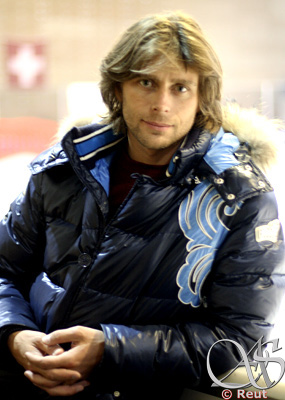 Two-time (2000 and 2002) Four Continents Champion and five-time (1999-2003) U.S. National Champion, Peter Tchernyshev, is mostly recognized in Russia as a celebrity and husband of actress and TV-presenter Anastasia Zavorotnyuk. Quite a few noticed him in various skating shows on Russian TV during the last few years, but only those who follow figure skating know that he is also a very successful choreographer and in more and more demand recently.
Two-time (2000 and 2002) Four Continents Champion and five-time (1999-2003) U.S. National Champion, Peter Tchernyshev, is mostly recognized in Russia as a celebrity and husband of actress and TV-presenter Anastasia Zavorotnyuk. Quite a few noticed him in various skating shows on Russian TV during the last few years, but only those who follow figure skating know that he is also a very successful choreographer and in more and more demand recently.
Peter, I'm a very big fan of your work as a choreographer, especially of the programs you create for Alexander Smirnov and Yuko Kavaguti. How did your collaboration start?
All this started a while ago when Tamara Moskvina was still working in the States with her skaters. We were practicing at the same rink, Ice House, in New Jersey. Since I was good friends with John Zimmerman (then coached by Moskvina, with his partner Kyoko Ina - ed.), I started to help them with show programs for their professional career and that went really well. Guys liked the programs, the public did too. Tamara saw me working with Kyoko and John and after she was already back in Russia, she asked me to create an exhibition program for Elena and Anton (Berezhnaya/Sikharulidze). It was some kind of a mix of hip hop, disco and "Yablochko" (Russian Sailor Dance). Later, Tamara asked me if I want to give it a shot with competitive programs too. And I said, "Why not?"
I have been working with Sasha and Yuko for a few seasons already and I've done some show programs for them as well. They are very nice people. Aside from the fact that the choreographer has to enjoy what he is doing, it's a double bonus when you also get along with those people.
So let's talk about my most favourite program of yours and theirs, "Clair de Lune", long program for seasons 2010/11 and 2011/12. Whose idea was it? Tamara's or yours?
It was my idea. Tamara actually wanted to do something different for them. She said, "I like this music, but I'm not sure it is going to work for this pair." She is a very easygoing person but sometimes it takes extra time and effort to convince her to keep trying. She'll give you the chance to try,  but she can give up fast because she is feeling the pressure of the time passing. Obviously, they have to practice, to prepare for the season, but this time it worked out in the end.
but she can give up fast because she is feeling the pressure of the time passing. Obviously, they have to practice, to prepare for the season, but this time it worked out in the end.
And what was the idea behind it?
It's always good for skaters to know what they are skating about. Even if it doesn't come across to spectators as clearly as they understand it, it helps them to put more feelings into their performance and that for sure will be noticed by the judges. This music was used in the movie "Twilight", and the story behind it was about the love between the vampire and the girl, so I was trying to explain, "This movie is very popular now, the story is pretty romantic, once you know what you're skating about, it is going to help you get through [the performance] and generate real emotions. Maybe you can forget about the technical aspects - not completely forget - but try to emphasize the emotional side rather than the technical."
I saw them skating the program beautifully at Cup of Russia (Grand Prix Rostelecom Cup 2011) and I'm very happy that they did justice to this program.
They really showed it the way you imagined.
Yes. You know, this music is so gentle and soft, you might think that pairs skating where you have more athletic elements, which are rough like throws for example, would not suit this music well. They improved a lot with the flow of their skating; Yuko especially gave a lot of attention to the softness of the arms, trying to be subtle rather than obvious and dramatic. They were skating with some reserved inner feelings that people could see and understand. I think it was a step up for them. I think they felt comfortable in this program and I'm glad it showed.
Do they usually ask for your advice about costumes and hair?
I can give my two cents throwing some ideas on the table, but I don't want to be too pushy. I believe that any skater has to go through the process of what's working for him/her and what is not and try different things because only by going through such a process can you grow as a person, as a professional. I think they are doing fine with Tamara, searching through what's right for them in that department. 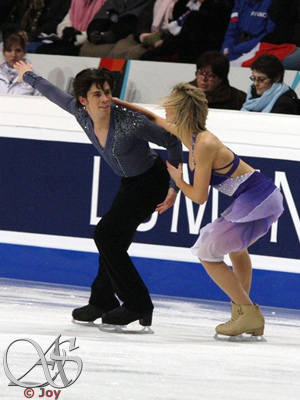 My taste is very subjective. Also I'm already looking at it from the viewpoint of professional skating, not the amateur sport where judges can pick on anything if they want to. The skaters need to give them less chances to pick on them. You have to get to the very top to dictate the fashion and define what's trendy and what's not, but until you're there, it's a bit risky.
My taste is very subjective. Also I'm already looking at it from the viewpoint of professional skating, not the amateur sport where judges can pick on anything if they want to. The skaters need to give them less chances to pick on them. You have to get to the very top to dictate the fashion and define what's trendy and what's not, but until you're there, it's a bit risky.
After your work with Yuko and Sasha was noticed and appreciated, did you get more requests to choreograph skating programs?
I helped a few people. For example, I made a free dance for Sinead and John Kerr (to "Exogenesis" by Muse for season 2010-2011 - ed.). They had an injury and couldn't give 100% to the program, but still I liked what I saw.
Back in the States, I worked a lot with younger skaters, making programs for them. I was really enjoying it because as a choreographer you grow as you work. You find things that will work even with smaller skaters, but as I said before, the choreographer must be interested in what he is doing and satisfied with what he sees. You want to see what you're doing the way you envision it and if the technical and the artistic ability of the people you work with is not that high you might start thinking, "Why did I let myself get into this?"
In general, I can't define myself as a choreographer for the entire skating world. It wasn't my main priority in any case. As long as I'm still skating in professional shows, sometimes - even subconsciously - I keep things reserved for myself before I give them to somebody else to do. Maybe it will change with time.
So all the programs you're skating now in shows are choreographed by you?
Yes, pretty much.
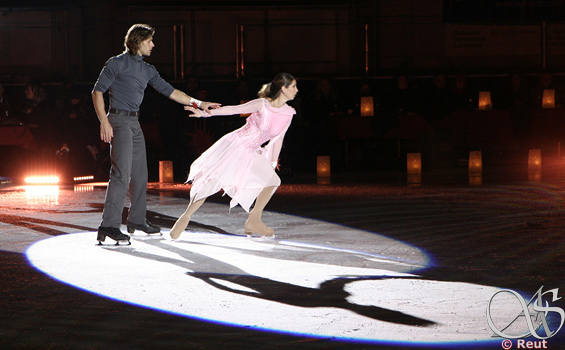
And not only choreographed. For example, I know that for your "Adagio" program, you also composed the narration.
We did "Adagio" right when Naomi (Lang) got back to skating after she had her first child. This program is a little bit more philosophical. I wrote the narrated text in Russian, then translated to English, then asked Naomi's husband who has a degree in journalism to edit it and I asked the sound director of the Blue Man Group to narrate it.
Do you have any other non-typical ideas to add to your programs?
Yes, of course! But you don't expect me to tell them to you now, right? (smiles)
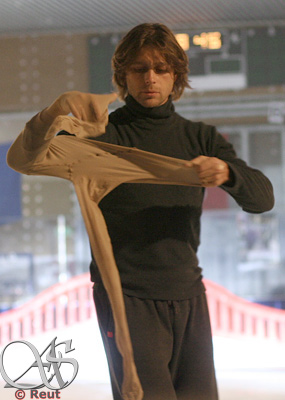 How did your TV career start?
How did your TV career start?
At that time I was working with Ari Zakarian and he asked me if I was interested in doing something in Russia. We've done some shows in Russia before with Evgeni Plushenko's tour, but this was for TV, which I've never done before. I thought it might be interesting and it was. It also turned out to be life changing event for me because that year I...
Actually, to get this story straight, the first year I got an offer, I turned it down because we already had some prior commitments and I didn't have a good feeling about it I guess. The season was over and I heard some great comments about how wonderful the show was and how the Russian audience loved it. So the next year I had no doubts that I want to do it (it was "Dancing on Ice", aired on Channel Russia in 2007 - ed.).
And you won it, right?
Yes, I won that season with my partner, Julia Kovalchuk. The whole experience was great because she was a workaholic, tried to learn as much as she possibly could and was very down to earth and a good person. We really enjoyed what we were doing. So that plus her talent and my expertise let us win the show with the help of the judges and the audience.
However, the greatest thing was that I met my wife there (she was the host of the show - ed.). I'm very thankful, first of all to Ari Zakarian who brought me there and second, to the Channel Russia that gave me an opportunity to participate in that show. Looking back, it was the right choice.
And then you were so good that they invited you to the "Ice Age" show? (the competing program on another channel - ed.)
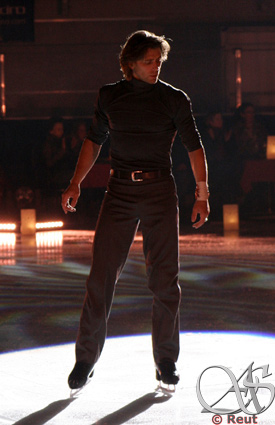 Well, the story was a little bit more complicated. By the time the next season was about to begin, my wife received the offer from Channel One. For me that would have been strange to stay on Channel Russia. I had to "sit out" for one season and the year after I was in "Ice Age".
Well, the story was a little bit more complicated. By the time the next season was about to begin, my wife received the offer from Channel One. For me that would have been strange to stay on Channel Russia. I had to "sit out" for one season and the year after I was in "Ice Age".
Out of all the TV projects you did - on the ice, on the ice and on the floor, skating and dancing ("Ice and Fire"), dancing with a ballerina ("Bolero") - which one was the most interesting for you?
I can't pick just one because each project was very interesting on its own. The first one, on Channel Russia, was very interesting for me because it was just completely new. I hadn't done anything like that before. I never skated with a non-skater before. I have a decent experience in coaching skating, but it was different. I've learned something new there, being constantly surrounded by actors and singers and people from the show business. For example, I've learned from how they act in the public eye.
The second season was very different because that was on Channel One. I could compare two shows, two networks and different production companies. I'd say, with all my respect to Channel Russia, Channel One was more professional. They did a great job not only in maintaining the interest of spectators but also in motivating us, the skaters, to constantly grow. I could see that Ilia Averbukh and his whole team were putting 100% into every single number. On Channel Russia, 80-90% was dependent on the professional skater. On Channel One, there was more freedom. If you felt like you wanted to do something, you were 100% free, but if you were struggling, they helped to generate great ideas. This gave me, a professional skater, a lot of new information and new tricks to use.
In the third season part of the programs were not on the ice but on the dance floor. I hadn't done anything like that before.
 I read that you have some ballet background though.
I read that you have some ballet background though.
I was taking some ballet classes when I was a child, from eight until 13 years old. At some point, I was dancing a few hours of ballet a day. I even had a ballet bar in our living room. But it's not the same when you're 13-14 and when you're forty...
Dancing in general is very close to ice dancing, naturally, more than to freestyle skaters so for me it was very similar and I was really looking forward to it. That season [in "Ice and Fire"] I was working with Nadezhda Granovskaya and she was also a very easygoing person and nice to work with.
One thing that you learn from these projects is that in the world of show business there are surprisingly many people who are down to earth. They are willing to listen to professionals and to share whatever knowledge they can.
In "Bolero," you suddenly became "the unprofessional half of the pair."
Well, I had some experience already from the previous season of "Ice and Fire", when we broke new ground dancing without skates on the floor. We already had a sense of what worked, what didn't work for the cameras, which was important and was part of the deal, as this was a televised show. When you build a program on ice, for example, you think of how it will be best for the cameras to fetch more speed and dynamics. On the floor, it is a little bit different, but we were all learning fast, so I came to that season of "Bolero" more or less prepared. In the end, it took way more effort than we were thinking because the high professionalism of the ballerinas, we were obligated to work really hard.
Irina Perren, your partner in "Bolero", praised you a lot in her interviews and said that from the first meeting you got along really well.
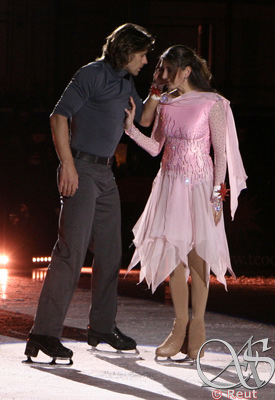 Yeah, that's true. I was the non-professional in this scenario and she was so... I shouldn't say "patient", I hope I wasn't giving her hard time (laughs)... but from the very first practice we were getting along so well that there was never feeling that we want to stop rehearsing, because some of us was getting tired or annoyed.
Yeah, that's true. I was the non-professional in this scenario and she was so... I shouldn't say "patient", I hope I wasn't giving her hard time (laughs)... but from the very first practice we were getting along so well that there was never feeling that we want to stop rehearsing, because some of us was getting tired or annoyed.
I got to work with the greatest ballerina and learned a lot from her, and her husband was very helpful too. He is also a dancer in the Mikhaylovsky Theatre and they do quite a lot of numbers together. So he was sharing his knowledge of partnering in ballet, which is apparently very similar to the ice dancing. He was surprised: "Wow, you're getting it so fast!" But I was twizzling and turning and spinning my partner for so many years!
There was some kind of team spirit involved too, because we were divided to the "Moscow team" and the "Saint Petersburg team". It was not the main factor, at the end of the day you need to do the performance, just yourself and your partner. But there was a good spirit, an encouraging atmosphere from the teammates to not give up, to push a bit extra. When the project was over we all felt that we've just started, we've just gained that momentum to build on what we've accomplished already and then - bang, we have only eight episodes.
So you tried to skate and to dance, with professionals and with laymen, what's next?
For myself? Honestly, since my wife is an actress, I have a weak spot for movies, for theater. It's something I would like to get myself into. Maybe not acting, but to be involved in one capacity or another in the process because I believe it's the same creative aspect and it is close to what I've been doing for so many years.
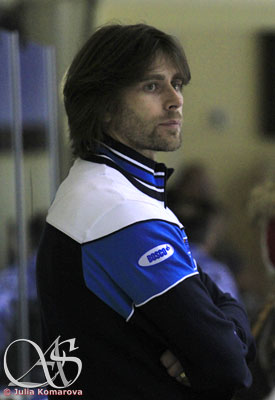 This off-season, Peter was busier than usual. Aside from his continuous collaboration with Tamara Moskvina's students, he was also invited by Tatiana Tarasova to help Maxim Kovtun and Adelina Sotnikova, coached by Elena Vodorezova-Buyanova. And in the end for each one Tchernyshev choreographed all three programs - short, long and exhibition. "Peter was always a very creative person; he excelled at skating skills," Vodorezova said in one of her interviews. "But to have good skating skills is one thing and to be able to teach someone is another. Hence, I was, from the very beginning, curious to see what he had to offer to Sotnikova and I was amazed at how naturally he found the style in which Adelina feels absolutely comfortable." "When Peter finished my short program, I had no words for it," recalled Adelina. "I saw how it looked on the video and I loved everything. A lot of heart and soul was put into my programs; I perform them with pleasure and hope to be able to show all their beauty at the competitions." Maxim Kovtun was not less excited, "I worked on my programs with Peter Tchernyshev. He is a skating genius! I never saw someone like him. This person, I think, skates better than everyone on Earth".
This off-season, Peter was busier than usual. Aside from his continuous collaboration with Tamara Moskvina's students, he was also invited by Tatiana Tarasova to help Maxim Kovtun and Adelina Sotnikova, coached by Elena Vodorezova-Buyanova. And in the end for each one Tchernyshev choreographed all three programs - short, long and exhibition. "Peter was always a very creative person; he excelled at skating skills," Vodorezova said in one of her interviews. "But to have good skating skills is one thing and to be able to teach someone is another. Hence, I was, from the very beginning, curious to see what he had to offer to Sotnikova and I was amazed at how naturally he found the style in which Adelina feels absolutely comfortable." "When Peter finished my short program, I had no words for it," recalled Adelina. "I saw how it looked on the video and I loved everything. A lot of heart and soul was put into my programs; I perform them with pleasure and hope to be able to show all their beauty at the competitions." Maxim Kovtun was not less excited, "I worked on my programs with Peter Tchernyshev. He is a skating genius! I never saw someone like him. This person, I think, skates better than everyone on Earth".
Equipped by Peter Tchernyshev with the best programs possible, both Adelina and Maxim will fight for medals this weekend at Cup of China.



